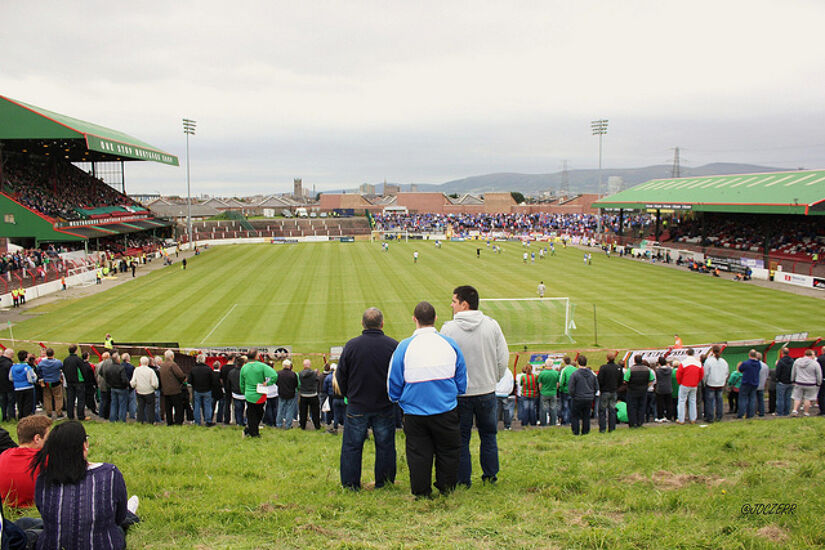Stephen O'Flynn interview - Any time I did well was when I enjoyed my football

Credit: Extratime Team (ETPhotos)
Throughout his career, Stephen O’Flynn has overcome injuries, disenchantment with football, while also advocating a part-time ethos for domestic clubs. ExtraTime.ie caught up with Stephen to discuss the aforementioned and much more.
As a teenager O’Flynn spent three seasons at Wimbledon before the London club rebranded and a franchise set up in Milton Keynes: “In my final year they got relegated from the (English) Premiership … That was the end of the ‘Crazy Gang’ and start of their decline. There were a lot of players let go and I probably wasn’t good enough.”
Following a season each with Cork City and Limerick, a return to Leeside in 2004 made for a frustrating second stint with Stephen’s hometown side: “I got injured a week before that season, breaking my leg against Galway in a friendly … That was a major setback and I only made a token gesture appearance towards the end.”
2005 saw the Mallow native sign for Derry City who were then managed by Stephen Kenny. He went on to score the winner from the penalty spot against IFK Göteborg during 2006/07’s UEFA Cup clash.
“I was grateful to take the penalty. People say there must have been pressure, but it was an opportunity to score in a big game.”
During Pat Fenlon’s short tenure as the Candystripes’ manager, the forward became surplus to requirements: “It was a 20-second phone conversation and he didn’t even have the decency to call me into his office, but things didn’t work out for Pat either.
"He left six players go, bringing in several others, which was unusual because we’d finished runners-up in back-to-back campaigns, winning the FAI Cup and two League Cups.”
O’Flynn then joined Galway United, but a combination of injuries and an overambitious outfit, resulted in the Corkonian seeking pastures new midway through his second season.
“Galway had talented footballers, but we were overpaid and didn’t perform. The club couldn’t afford to pay wages, so they offloaded players. I needed a double-hernia operation and had no help from the PFAI because I signed a mutual contract.
"There was nothing they could do for me and Galway wouldn’t pay for it. I had to get a Credit Union loan and fly to England to get it done.”
Stephen re-joined Limerick, making the First Division Team of the Year after a staggering 14 goals from just 13 appearances: “I was at my happiest. Any time I did well was when I enjoyed my football.”
Exceptional Shannonside form earned O’Flynn another crack at English football in early 2010, when Northampton Town needed a considerable gap filled up front.
“Ade Akinfenwa was injured and I got a call New Year’s Eve from an agent, asking if I’d go on trial. They offered a six-month contract, but because of heavy snowfall there were about four games called off in January. When the fixtures resumed, Akinfenwa was fit and I only made six or seven substitute appearances.”
A third spell with Limerick ensued – Stephen arriving during 2010’s summer transfer window. Averaging better than a goal every two games, the striker explains why he always excelled for the Munster club.
“It was being part-time and looking forward to matches. With full-time football, if you’re not playing, it’s hard to sit there ... Like a secretary not answering the phone, but still has to go to work. You want to do your job, but not allowed to do it.”
However, Premier Division football’s temptation proved irresistible for O’Flynn in 2012, as St. Patrick’s Athletic lured him away for his final League of Ireland season.
“Liam Buckley brought me in, but the style of football didn’t suit me. If someone had said at that time I’d go on to score in a Champions League qualifier and win the First and Premier Divisions in Northern Ireland, I would have laughed at them.”
Stephen goes on and clarifies about his retirement from playing at a relatively young age and how his passion gradually reappeared: “I was disillusioned with football. At 30, I wasn’t prepared to sit on the bench. The final straw was we were playing Derry in a cup final at the Aviva and I wasn’t even in the squad.
“Things were going on at the time and probably a touch of depression as well … No qualifications and not knowing where I was going with my life. I started doing radio commentary for Derry games, went home and a buddy asked me to play five-a-side. After some convincing, I thought ‘why not?’ I got fit and eventually signed for Institute.”
O’Flynn owes his resurrection across the border to a financial decision, in addition to an emotional one: “On retiring down south, you can claim tax. I couldn’t play in the domestic league again, unless I paid it back, which I wasn’t about to.”
Enthusiasm restored, Stephen steered Institute to promotion as First Division Champions: “I’d nothing to prove, but to myself. Within a year, I became a senior player, leading youngsters and using my experience to get them over the line ... That’s when I considered coaching.”
Halfway through 2014/15, O’Flynn switched to Crusaders, who secured consecutive Premier Division titles. Infrequent introductions this year before joining Ballinamallard United until the season’s end, he’s proud of his contribution, regardless of insufficient games resulting in no personal silverware.
“I signed in January 2015, made 12 substitute appearances, entitling me to a medal. I played less this year, scored more goals, but felt my input was bigger. Last season I was getting five or ten minutes and not influencing results, but this year I got last-minute winners and equalisers, earning the club valuable points.”
Fresh from play-off relegation heartache with Ballinamallard and on Glentoran’s books for 2016/17, Stephen concludes by sharing his future aspirations: “I’m coaching with the Crusaders ladies, looking to get my badges. This time next year, I’ve my mind set on something similar in America.”

